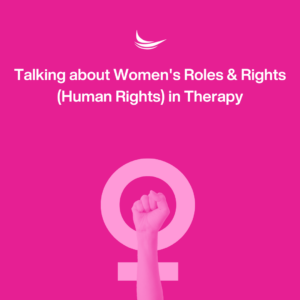Talking about Women’s Roles & Rights (Human Rights) in Therapy
 Women’s roles and rights have changed throughout history, impacted by the women’s rights movement in the US. Violation of human rights by experiences such as discrimination, violence, lack of choice or opportunity, restrictions on freedoms, and silencing of one’s voice through oppression and power control are topics that frequently show up in therapy and are not only national concerns but also global issues. “Human rights are rights inherent to all human beings, regardless of race, sex, nationality, ethnicity, language, religion, or any other status”. It is important to consider the impact of gender and other aspects of identity when exploring discrimination and privilege related to human rights and the emotional, psychological, and social implications on one’s mental health.
Women’s roles and rights have changed throughout history, impacted by the women’s rights movement in the US. Violation of human rights by experiences such as discrimination, violence, lack of choice or opportunity, restrictions on freedoms, and silencing of one’s voice through oppression and power control are topics that frequently show up in therapy and are not only national concerns but also global issues. “Human rights are rights inherent to all human beings, regardless of race, sex, nationality, ethnicity, language, religion, or any other status”. It is important to consider the impact of gender and other aspects of identity when exploring discrimination and privilege related to human rights and the emotional, psychological, and social implications on one’s mental health.
Movements in women’s rights branching out of the antislavery movement with the abolitionist movement of the 1830s and feminism movements of the 1960s and 1970s in the United States are identified as key to the women’s history timeline. Early themes throughout the history of women have included expressing concern about patriarchal systems, lacking representation, or voice, and feeling bound by laws that have perpetuated issues with power-control dynamics such as discrimination, intimate partner violence, and equal opportunities. These topics are still relevant today. Removing inequalities in social, economic, and political areas is opening more opportunities for advancement and empowerment for women.
First lady Abigail Adams was considered an early advocate of women’s rights, including education, and the abolition of slavery. She lived during a period when married women had limited property rights. It wasn’t until 1981 that the court overturned state laws in Kirchberg-v-Feenstra. This challenged law in which the husband was “head and master” of all martial property which allowed him to control property without the wife’s consent. March 31, 1776, In a letter to her husband, 2nd US president John Adams she writes “I desire you would Remember the Ladies, and be more generous and favorable to them than your ancestors. Do not put such unlimited power into the hands of the Husbands. Remember all Men would be tyrants if they could. If particular care and attention is not paid to the Ladies we are determined to foment a Rebellion, and will not hold ourselves bound by any Laws in which we have no voice or Representation.”
Did you know that one year later in 1777, all states passed laws that took away a woman’s right to vote? While there has been progress made in women’s equality, those advances have also been dependent on legislation that impacts rights. Constitutional equality needs to be prioritized. “Equality of rights under the law shall not be denied or abridged by the United States or by any state on account of sex.”
The 1960s was a decade of change for women, as the “second wave” of feminism began and then started to lose momentum in the 1970s. Acts such as the Equal Pay Act (1963) and the Civil Rights Act of 1964, followed by the Title IX Education Amendments Act(1972) were during this period. The landmark Supreme Court ruling of Roe v Wade in 1973 legalized abortion. In 2022, The Supreme Court overturned Roe vs. Wade, nearly 50 years earlier after a right to an abortion.
Physical integrity, being free from violence, and having choice over basic freedoms and rights is vital for physical and emotional safety. The more choice one has, the greater their sense of freedom and autonomy. This includes the decision to choose or choose not to marry or enter intimate relationships and decisions related to one’s body and reproductive rights as well as access to equal opportunities in education and the workforce without discrimination.
The National Organization for Women Foundation (NOW) identifies core issues that impact women’s rights (which are “human rights”) today. These include the following:
- Economic justice
- Racial justice
- Ending violence against women
- Reproductive rights and justice
- LBGTQIA+ rights
- Constitutional equality
Therapy provides a safe space to freely express your thoughts and feelings on topics related to human rights. It can be incredibly powerful to speak out, be validated, advocate, and feel empowered. Please reach out if you would like to speak with a professional about your experiences on topics such as those impacting your feelings of choice and personal freedom.
Written By: Charlotte Johnson, MA, LPCC



























